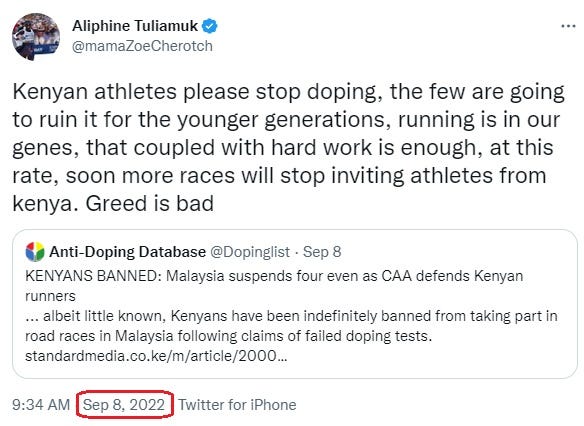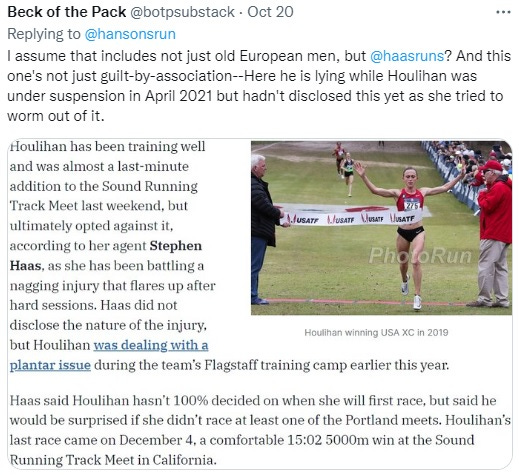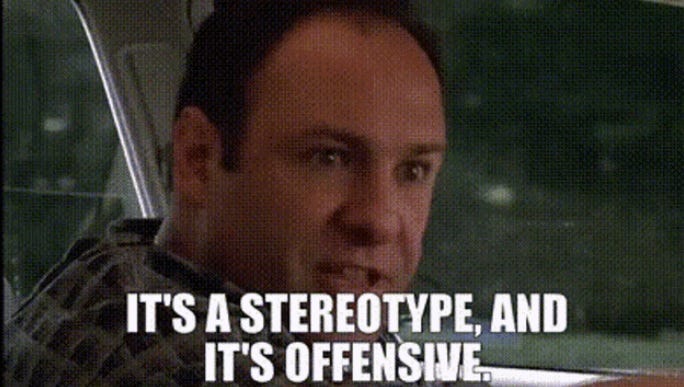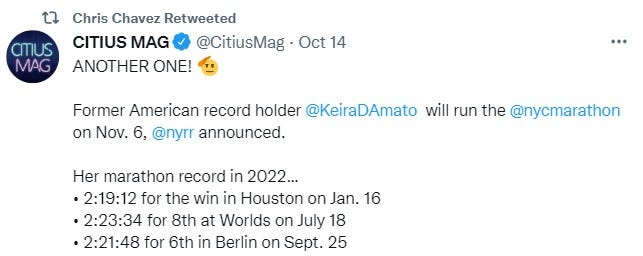Running from the Facts: "Stop making Kenyan women dope before it infects the entire sport!" edition
The running media and pro runners—whose careers depend on myths—follow the same script with every new doping revelation: Blame-shifting, American exceptionalism, or silence
A little over a week ago, some unusually rancid doping revelations plopped wetly into the news cycle like a dollop of fresh afterbirth. The now-disqualified winner of last year’s Boston Marathon, Diana Kipyokei (or “Kipyogei,” not the way she prefers to spell it), is evidently part of what might be described as a Kenyan doping ringlet, with triamcinolone the substance of primary interest.
The responses from the usual sources were predictable. Letsrun covered the story like a traditional sports outlet would have, Fast Women blamed men, Citius Mag and Women’s Running pretended nothing had happened, various pundits took selective stances on shady agents, and professional runners were widely silent.
Actually, Kenyan-born American and 2021 Olympian Aliphine Tuliamuk did have something to say about cheating among runners in her nation of birth. Problem is, she dispatched the tweet below both too late (for example, the 2021 Boston Marathon was in 2021) and a little too early (news of further, even-more-consequential malfeasance by Kenyan runners wouldn’t emerge for another five weeks).
This tweet contains more than it appears to on first pass. In addition to calling for an end to doping, Tuliamuk offers up the idea that Kenyans as a rule possess genetics favorable to excelling at distance running, an idea traditionally permissible only in conservative circles. She suggests that talent and hard work alone are “enough,” although I don’t know if she means “sufficient to win” or “all an athlete should bring to the starting line.” (It should be noted that Tuliamuk speaks multiple languages, and uses English far better than I use any language besides English.)
I’m not sure it’s only “the few” who are earning Kenya a reputation for being as dirty as any country, and none of the new stuff is a surprise to anti-doping advocates. And finally, if races did categorically ban Kenyans, which is wildly unlikely, Tuliamuk herself would still be able to run in them. I sense that she’s very earnest about all of this and somewhat deluded in the bargain.
Anyway, below are reactions to some of the usual suspects’ reactions.
As of early Sunday morning, Women’s Running had not mentioned the Kipyokei story—which became public on October 14—at all. Nothing. After Kipyokei’s now-deleted Boston win last year, Erin Strout, now deleted from Women’s Running’s “staff” but still an occasional condribbliter, wrote a story for that publication that hasn’t been updated to reflect the amended results and stands as the only mention of Kipyokei on the site.
Strout herself had other priorities as the doping news was emerging. That woman follows the most persistently whiny and uninformed shitlibs and crap-artists on Twitter. There is absolutely nothing she won’t believe if it fulfills an emotional need. I should feel bad for her, but she makes that hard by keeping the personal suckage dial cranked up to eleven.
Letsrun did a thorough job with its piece, but perhaps should have waited to declare triamcinolone “a new super drug.” It’s been banned for a long time and getting people in trouble for just as long.
The Letsrun story quotes Kipyokei’s agent, Gianni Demadonna, on the economic incentives for runners to dope:
“And the difference to be number 1 and to be number 10, it’s amazing. Boston Marathon, $150,000 for first, 10th maybe $5,000 (note: it was $5,500 in 2022). So you can understand that there is maybe a minute or two minutes between number one or number 10. But there is 20 times or 10 times more or 30 times more money for first. So it’s true that with one race you can change your life.
“It must be clear, I don’t justify [doping]. I just explain to you what may be driving these athletes to become so stupid.”
Yeah, I’m sure this asshole only takes clean money. Athletes aren’t stupid, but thanks largely to people like this guy, the general running public is ignorant about the true prevalence of doping.
Concerning athlete agents in the Demadonna class, Hansons Running offered this idea:
When asked if this list of agents should include proven liar Stephen Haas, Shelby Houlihan’s agent, The Hansons and everyone else “present” were silent.
That thread featured snide suggestions that Kenyan dopers are typically overseen by Italian agents. Maybe so, but does that let exceptions off the hook?
Alison Wade of Fast Women again established why she's no advocate for running, women's or otherwise. As always, rather than lament the drug-soaked state of the sport, she's desperate to both wish doping out of existence and pin the blame for it on the nearest available men. No women, apparently, choose to cheat.
Not allowing women to be saddled with any responsibility for adverse decisions is a defining pattern with Wade. She’s on a continual hunt for evil coaches of female athletes to purge from the ranks, and when an offender turns out to be a woman, she unpretentiously finds a way to pin the blame on men.
Recently, someone made a short film about an abusive coaching situation at Texas Christian University. Wade watched the film expecting a male coach to be the antihero, and when the coach under fire turned out to be a woman, Wade “explained” that the coach must have been the victim of abusive coaching herself and therefore simply didn’t know better. (I honestly can’t remember why I highlighted the text I did in the first image; I think I had questions about some of the adjectives in play.)
I’ll grant that male coaches are responsible for a lot more abuse than female coaches, and I suspect this is true even allowing for the fact that the profession is male-dominated. Also, when men sin in this area, the worst of them reach catastrophically disgusting levels of sexual conduct that women simply could not achieve without a combination of sedative drugs, firearms, and an entirely revamped nature.
And concerning the allegation that African runners are surrounded by sleazy and subversive agents: Also true. This goes on around the world, and my understanding is that Kenyan women don’t have the personal agency across social situations that their American counterparts enjoy, likely worsening any coercion or manipulation they face.
But none of this provides a reason to uniquely excuse women who have already been caught doing something against the rules. A lot of Wokish logic quickly leads to argumentative self-strangulation, in this case the ignoring of an obvious question: If abusive women can blame their mentors, why can’t men? And if, leaving aside physical differences, female humans are as inherently strong, wise, as capable as male humans, then why do running “feminists” immediately circle the wagons to protect women in every situation, including when they have clearly strayed?
Aliphine Tuliamuk seems to think Kenyan women have a choice. Hey, what about Nigerian-born American marathoners who dope—and return to win prize money? Does Wade think black women from other continents are just not as…never mind.
I honestly think that Wade and her equally cynical followers could be satisfied only with a literally sex-segregated society. Whatever happened in their lives to drive them toward this idea, it’s too bad those experiences can’t all be undone at once.
Citius Mag, you’ll recall, is a collection of jack-offs “led” by Chris Chavez that produces podcasts and articles for other jack-offs who place a startlingly high premium on sniffing the assholes of running’s celebrities, insofar as that term really applies to anyone who jogs quickly for a living.
More importantly, Citius Mag is for all practical purposes owned by the mega-wealthy co-founder of Nike. For as long as Chavez and his band of gibbering cohorts are operating, they will steer as clear of doping stories as possible while feigning the appearance of a comprehensive running-news outlet. This is more important than people who plan to follow running for a while probably realize, because Citius Mag isn’t the only outlet that is under what amounts to a journalistic gag order coupled to a bribe.
Kipyokei is, or was, sponsored by adidas, so it’s not a Nike issue per se. Yet Citius Mag's “coverage” of the Kipyokei-triamcinolone mess has consisted of a self-retweet of quoted text of a "statement from the BAA." Nothing to see here!
It was a good week instead to focus on clean, wholesome Americans.
It would be enlightening—not just to me but to every other longtime follower of this underwear-skidmark of a sport—if Chavez or someone in his august crew of analysts could explain how an American woman who averaged 8.1 miles a day in 2021 and 9.5 so far this year managed to produce a 2:19:12 marathon in January and is about to race her fourth marathon of the year (and her third in 3-1/2 months). Why does everyone else train so damned much when supershoes are available on race day? We got a real trailblazer here, and not because she’s a gracefully aging mommy with a new Strava pun for every run.
Let’s say we* cut Chavez some slack and view his own concept of his job as generating positive and only positive publicity for professional American distance runners. That theory immediately fails, because in addition to previously being interested in doping, he’s made forays into social-justice topics before, spectacularly stupid ones. This is obviously a ploy to draw readers away from generally Wokism-averse Letsrun, but either way, if Citius Mag is devoting time and space to pieces like this one, surely the crew could find time to wax dejected over the ruination of the Boston Marathon and its deeper implications.
I’m being told this is pushing the e-mail length limit, so I’m deferring a section about Kara Goucher’s reaction—and I complain about Goucher’s online activities a great deal, but mainly because she at least takes the step, whatever her motivations, of diving into these ugly issues when she could give the finger to running instead—and her apparently unrelated plans to record a full-snark podcast with Desi Linden. But even if I had more space, I’d sum up the reaction from active pro runners the same way I am now: Radio silence. It’s full omerta now from the folks who in theory have the most to lose when pro runners cheat.












